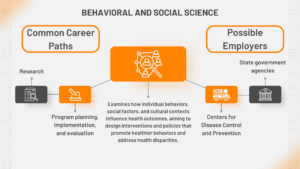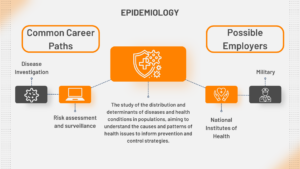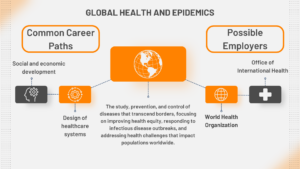Bachelor of Science in Public Health (BSPH):
Population Health Sciences Concentration
Do you want to declare the Public Health Major? Get Advising? Petition a course substitution?
Go to CEHHS advising to declare the public health major, get public health advising, and fill out a course substitution petition form.

The Public Health major with a concentration in Population Health Sciences provides students with a broad-base of science, math and social sciences curriculum grounded in a public health core. Population health is an organizing framework that integrates the healthcare delivery system with the broader public health, social, economic, and political systems that contribute to health. Students develop the knowledge and skills needed to apply an evidence-based approach to address complex problems
Are you considering a Master in Public Health (MPH) Degree?
Learn more about our
5-year Bachelor’s to Master’s accelerated program.
About the Major
We equip students with the essential Public Health Bachelor’s Degree knowledge and skills.
BSPH students will demonstrate the following two foundational competencies:
-
- Communicate public health information, in both oral and written forms, through a variety of media and to diverse audiences.
- Locate, use, evaluate, and synthesize public health information.
Population Health Sciences students will demonstrate the following five competencies:
-
- Identify health issues and describe the impact on specific populations
- Explain factors that contribute to community health and health equity.
- Compare population health indicators across subpopulations, time, and data sources.
- Identify evidence-based solutions that engage diverse stakeholders to address population health issues.
- Explain systems thinking and its application to population health approaches.
BSPH majors receive instruction in the following 11 foundational knowledge domains.
-
- Concepts and applications of basic statistics
- Foundations of biological and life sciences
- History and philosophy of public health as well as its core values, concepts, and functions across the globe and in society
- Basic concepts, methods, and tools of public health data collection, use, and analysis and why evidence-based approaches are an essential part of public health practice
- Concepts of population health, and the basic processes, approaches and interventions that identify and address the major health-related needs and concerns of populations
- Underlying science of human health and disease, including opportunities for promoting and protecting health across the life course
- Socioeconomic, behavioral, biological, environmental, and other factors that impact human health and contribute to health disparities
- Fundamental concepts and features of project implementation, including planning, assessment, and evaluation
- Fundamental characteristics and organizational structures of the U.S. health system as well as the differences between systems in other countries
- Basic concepts of legal, ethical, economic, and regulatory dimensions of health care and public health policy and the roles, influences, and responsibilities of the different agencies and branches of government
- Basic concepts of public health-specific communication, including technical and professional writing and the use of mass media and electronic technology
BSPH majors will gain exposure the following 12 Concepts through curricular and co-curricular experiences.
-
- Advocacy for protection and promotion of the public’s health at all levels of society
- Community dynamics
- Critical thinking and creativity
- Cultural contexts in which public health professionals work
- Ethical decision making as related to self and society
- Independent work and a personal work ethic
- Networking
- Organizational dynamics
- Professionalism
- Research methods
- Systems thinking
- Teamwork and leadership
Progression to the BSPH requires a 2.8 cumulative GPA after Term 4. Students admitted to the program must maintain a minimum cumulative GPA of 2.8 while in the program. Students must earn a grade of C or better in all Public Health courses. Students who do not meet milestones for the program will be re-directed to other options. Students who fail to meet the standards for professional conduct during the practice experience or who do violate UT’s Student Conduct and Community Standards will not be retained in the major
What Can I Do With the Major?
Population Health Sciences Framework
This major is appropriate for students planning to enter the workforce in public health, research, healthcare, social justice, social services, non-profit, community-based or policy-focused careers as well as preparation for graduate training in public health, pre-med, pre-health professional, allied health, or other related fields.
Featured
Section coming soon!
back to top
Public Health Undergraduate Course Schedule1
Title
|
Schedule2 |
Foundational public health courses (21 credit hours) |
|
| PUBH 201 – Introduction to Public Health | Fall, Spring, Summer (1st session only) |
| PUBH 202 – Introductory Epidemiology | Fall, Spring |
| PUBH 320 – Social and Behavioral Theories in Public Health33 | Fall, Spring, Summer |
| PUBH 336 – Introduction to Research Methods in Public Health | Spring |
| PUBH 340 – Data Management in Public Health | Fall |
| PUBH 400 – Comparative Healthcare Systems | Fall |
| PUBH 401 – Global Public Health | Fall, Spring |
| PUBH 420 – Environmental Public Health | Spring, Summer (1st session only) |
Intermediate Foreign Language (6 credit hours) |
|
Population Health Sciences concentration courses (12 credit hours) |
|
| PUBH 315 – Health of Adolescents | Fall, Spring, Summer |
| PUBH 350 – Public Health Aspects of Aging | Fall, Spring |
| PUBH 430 – Suicide and Suicide Prevention Across the Lifespan | Fall, Spring |
| PUBH 440 – Population Health | Spring |
Practice Experience (3 credit hours) |
|
PUBH 489 – Health-related Applied Practice Experience
|
Fall, Spring, Summer |
1Please refer to the undergraduate catalog for course descriptions.
2Schedule will be updated as needed.
3PUBH 320 has replaced PUBH 220 as an equivalent course. If you follow the 2022-23 catalog, you will take PUBH 320 instead of PUBH 220. PUBH 220 is no longer offered. Please refer to the undergraduate catalog for course descriptions.
aPUBH 330 is an elective offered during the fall and spring semesters.
Join our Listserv
If you are a public health major or minor, be sure to sign up for the Undergraduate Public Health Listserv to receive updates on course offerings.
More Information
If you have questions about the Public Health major, please contact Undergraduate Program Director Julie Grubaugh.






